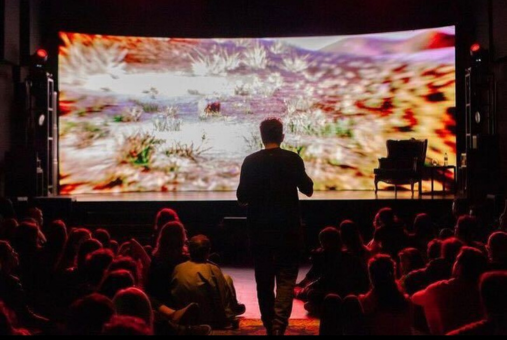
Freelance journalist Lezak Shallat was shy about sharing her 12-minute audio project in the discussion forums for an audio storytelling course offered by the Knight Center for Journalism in the Americas.
In 2017, she first started recording for this passion project about a jailbreak from an island full of political prisoners in the middle of Lake Titicaca, but the tape just sat in her files. She wasn’t sure where to even start.

Four years later, while the world was living through a pandemic, the course was a chance for her to finally turn the long-forgotten story of this escape into something.
Shallat was one of 392 people from 50 countries who registered for the Big Online Course (BOC), “Audio Storytelling for Journalists: How to tell stories on podcasts, voice assistants, social audio and beyond,” which ran from October to November 2021 and was taught by instructor Tamar Charney. Networking and exchanging projects with colleagues is a big part of Knight Center BOCs, and it would lead to a bigger collaboration for Shallat, who was based in the U.S.

“I received a note from fellow participant Tomás Pérez Vizzón, the producer of Fugas, an Argentine podcast series on jailbreaks,” Shallat told the Knight Center. “He’d never heard of that escape and wanted to explore the possibility of including it in his show.”
Pérez Vizzón is director of Fugas, a nonfiction, narrative production from Anfibia Podcast, which is part of digital magazine Revista Anfibia.
“I registered [for the Knight Center course] because it was a very interesting opportunity to hear the experiences of people who had been working in audio for along time and there weren’t – at the time, maybe there are more now – as many opportunities like that and above all there was nothing free, virtual, global,” he told the Knight Center.
That fortuitous virtual meeting between the two would eventually lead to a collaboration and an almost 40-minute podcast episode directed by Pérez, with Shallat as research consultant.

“After months of starts and stops and many Zoom calls, I shared all my tapes and research with the Fugas team,” Shallat said. “They took their own deep dive into the story, finding additional escapees to interview, writing a great script and adding top-notch sound design.”
Shallat handed over extensive notes, video testimony she’d found of escapees and the audio she had captured of Alejandro Torrejón Martínez, the central figure of her project.
During her years visiting in-laws in Sucre, Bolivia, she was told the most interesting person in town was Comrade Alejo, a leader of the Bolivian Communist Party – Marxist, Leninist, Maoist faction.
“Until recently, most days he could be found in the plaza, holding forth from his favorite bench, on his favorite subject: politics,” Shallat recalls in her audio project.

Torrejón had a very interesting past: he was one of the 72 political prisoners who escaped from Coati, the Alcatraz of the Andes, in 1972. It all happened during a soccer match between inmates and guards, but you’ll have to listen to the podcast to hear the rest. The political prisoners made their escape from the island prison on the Day of the Dead, and Shallat would share her project in the Knight Center’s Journalism Courses forums nearly 50 years later on the same day.
The Anfibia team picked up the investigation and found additional escapees who provided their testimonies of what happened. It’s a story in the “style of a Hollywood movie,” as Pérez Vizzón described.
When they finished the podcast episode, the Fugas team didn’t just release it on a streaming platform. They created an audiovisual experience that immersed listeners into the story.
In May 2022, a crowd equipped with vibrant blue-lit headphones gathered inside a cultural center in Buenos Aires for the launch of “La Alcatraz del Altiplano.”
Journalist Sebastián Ortega narrated the podcast live on stage with the sounds of soccer whistles and waves of Lake Titicaca in the background. The highlights are testimonies from various political prisoners who made their escape from Coati on that fateful day in 1972. On screen, audio waves, illustrations and photographs of the escapees brought the viewer along for a great adventure.
It’s all available on YouTube now, with English subtitles.
“The idea of doing live shows came out on the one hand because we had been very locked up after two years of the pandemic and we wanted to take the podcasts off the platform and go to our audience, go to collective listening,” Pérez Vizzón said. “And on the other hand, because of a challenge for us to try to also go towards another type of experience and another type of narrative that was more immersive than the one we had been flirting with for a long time.”

The immersive podcast experience has made it to various cities in Argentina, to Uruguay and will travel to the Gabo Festival in Colombia on July 1, 2023.
“This project of bringing Fugas to live shows began to have an impact on other podcasts where we also began to do the same,” he said. “The idea that each product, each of our podcasts has a scenic, performative, off-platform reflection.”
As for Shallat, though she resides in California now, she previously lived and worked in Chile and Central America, so she is not unfamiliar with Latin America. Yet, for her, the audio storytelling course from the Knight Center was a chance to meet, network and exchange experiences with colleagues working around the world, like Pérez Vizzón.
“This has been an exciting trans-American, bilingual collaboration that would have never happened if Tomás and I hadn’t connected in Tamar [Charney’s] class,” she said.
How have our courses and other Knight Center programs helped you? Please share with us at knightcenter@austin.utexas.edu. We’d love to hear from you!